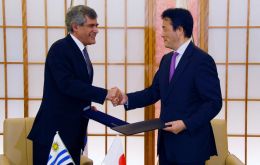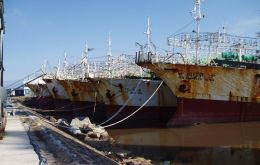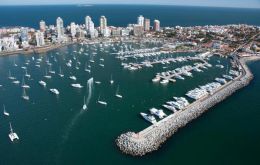MercoPress. South Atlantic News Agency
Uruguay
-
Friday, December 18th 2009 - 12:51 UTC
Ship loaded with Uruguayan livestock lost off Lebanon: 20 crew members rescued

At least 20 crew members were rescued Thursday night after a cattle transport ship with more than 80 people capsized in waters off the coast of Tripoli when storms battered the eastern Mediterranean according to Lebanese security and United Nations sources.
-
Friday, December 18th 2009 - 12:01 UTC
President Obama envoy met with Mujica and today visits Paraguay

Assistant Secretary of State for Western Hemisphere Affairs Arturo A. Valenzuela visited Uruguay on Thursday where he met with president elect Jose Mujica and Vice-president Danilo Astori.
-
Tuesday, December 15th 2009 - 10:58 UTC
US and Brazil agree on road map for Honduras national reconciliation

United States and Brazil agree ousted Honduran president Manuel Zelaya must have safe passage to leave Honduras and want the country's de facto president to step down to pave the way for national reconciliation, a senior Brazilian official said on Monday.
-
Tuesday, December 15th 2009 - 10:56 UTC
Japan extends grant to Uruguay for solar power development

Japan is extending Uruguay a grant of 8.5 million US dollars to finance a solar power project, according to official Japanese sources. Japan’s Foreign Affairs minister Katsuya Okada and his Uruguayan counterpart Pedro Vaz signed the document Monday.
-
Saturday, December 12th 2009 - 15:32 UTC
Uruguay tells Stora Enso: no new pulp mills next to Botnia

Uruguayan president elect Jose Mujica said Friday that Finland’s Stora Enso will not be constructing a pulp mill along the border with Argentina close to where another mill, Botnia is already functioning and has led to an ongoing conflict with the neighbouring country.
-
Saturday, December 12th 2009 - 14:57 UTC
Four Korean fishing vessels burnt and lost in Montevideo in two months

Between forty and fifty Asian crewmembers from two Korean flagged fishing vessels that caught fire Thursday night while docked in Montevideo, are being questioned by Uruguayan judicial authorities.
-
Thursday, December 10th 2009 - 11:40 UTC
Early next year Petrobras begins oil seismic surveying offshore Uruguay

Petrobras begins seismic surveying offshore Uruguay in early 2010 and will keep its level of investments in Argentina as part of the Latinamerica expansion policy of the Brazilian government managed oil and gas corporation.
-
Thursday, December 10th 2009 - 11:36 UTC
Construction of Stora Enso pulp mill in Uruguay is further delayed

Finaland’s Stora Enso, Europe’s largest paper and forest products’ company said Wednesday that the decision whether to construct a pulp mill in Uruguay could take “well over a year”.
-
Wednesday, December 9th 2009 - 08:42 UTC
Cruise visitors in Uruguay this season close to 400.000

Uruguay’s Ministry of Tourism forecasts some 400.000 tourists and crew members will be visiting the country during this summer cruise season, which represents a slight increase over the previous year.
-
Saturday, December 5th 2009 - 09:05 UTC
President-elect Mujica calls on Uruguayans “to talk less and work more”

President elect Jose Pepe Mujica said that Uruguay has a strategic position in the region with a great future and he conceives the country not as a “wedge” but as a “bridge”.
